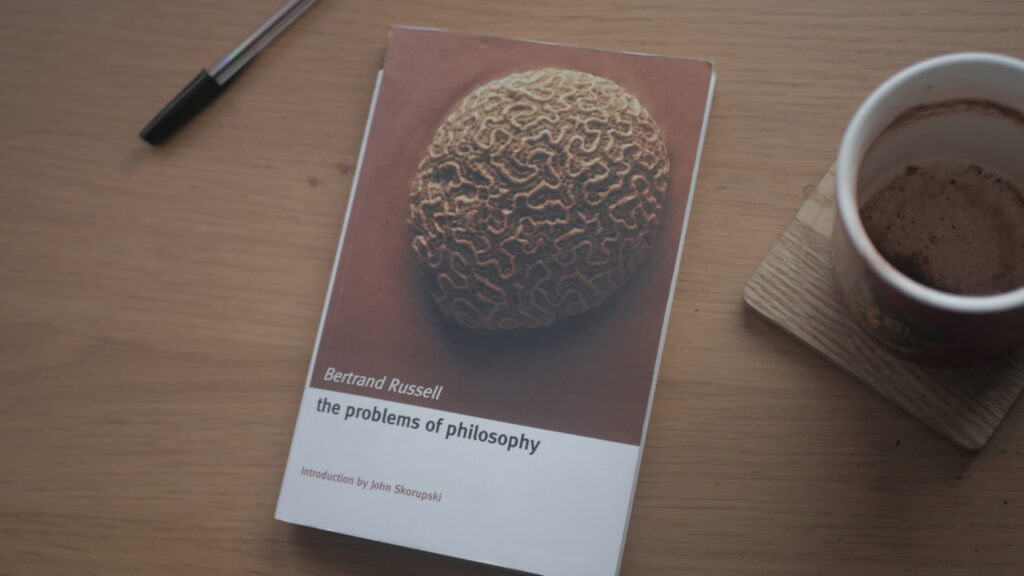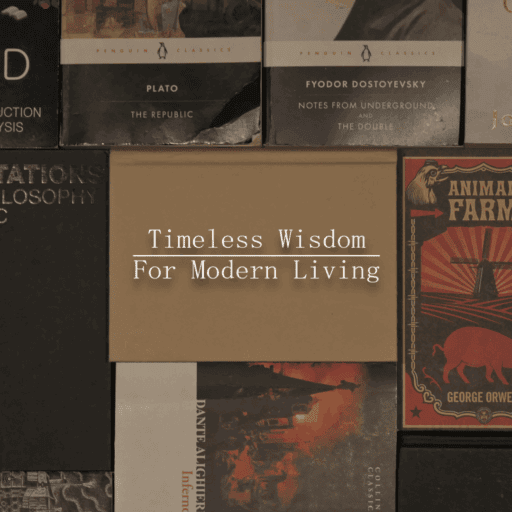
The Problems of Philosophy by Bertrand Russell
The Problems of Philosophy serves as a great introductory text for anyone looking to make a start in philosophy, and the big questions regarding existence itself.
It’s a recommended reading on Mortimer J. Adler’s Reading List.
The Problems of Philosophy makes Plato’s The Republic and Descartes’ Meditations much easier to grasp and handle. It serves as an excellent introduction for those seeking knowledge from the great classic works.
Bertrand Russell is considered to be one of the key figures in philosophy. In his book, Russell highlights the importance of philosophy in regards to seeking knowledge. Many people today believe that philosophy is mere waffle and a complete waste of time. Russell argues that this belief is wrong and self-limiting through questioning the existence of a physical object before him: a table. Who else would even dare question whether the table in front of them is truly real? A wise sage or a mad man? By questioning things that seem self-evident, Russell successfully showcased that not all things are as certain as we believe them to be.
We may never be able to get answers to all of the problems that philosophy poses to us, but we can never stop asking questions.
This post will take the key concepts and ideas from The Problems of Philosophy and show how they can be used as tools to solve modern problems; decision-making, how to find meaning and questioning our own beliefs and assumptions to maximize personal growth.
Epistemology: How Do We Know What We Know?
Skepticism about Knowledge
“Is there any knowledge in the world which is so certain that no reasonable man could doubt it?” – Bertrand Russell
Epistemology is the branch of philosophy concerned with the acquisition of knowledge.
Russell begins his quest for certain knowledge by encouraging skepticism and open-mindedness over dogma and rigid thinking. He rightly demonstrates that we cannot trust our own senses and perception; the appearance of things are relative in relation to our perception of them. Subjectivity is present in regards to all that we consider to be objective and irrefutable.
So which table is real? Is it any more or less real when I touch it firmly or gently? What if I walk around the table and notice the colors changing in relation to the light being reflected off of it: what is the true color of the table? Do I see the real color of the table compared to a colorblind man? Is the real color of the table only apparent to myself or the colorblind man? What exactly to we mean by ‘real’?
Appearances, or what we call ‘real’, is relative.
Russell goes on to argue that sensory data derived from physical objects is only a sign of some ‘real’ object that causes the ‘sense-data’ to exist (along with our existence in order to make the act of ‘sensation’, or perceiving, possible).
Appearances are a sign of some underlying reality. The nature of such a reality cannot be known to us for certain.
Application to Modern Life:
“…certainty is all we seek” – Bertrand Russell
Decision-Making
There are some things that we cannot know for certain. We take so much for certain and always think it is certainty that we seek. Therefore, when making a decision, the best course of action is one that can get us as close to certainty as possible; the strongest argument above all others. This is what should guide us in our decision-making process. The strongest arguments are what push the world forward and help people in their means towards reaching the ultimate end of living a righteous life.
“Whoever wishes to become a philosopher must learn not to be frightened by absurdities.” – Bertrand Russell
Open The Mind
We must not be scared to ask questions about any type of subject matter. Russell literally questioned the very nature of a table. How much more absurd could you possibly get? There really is no such thing as a stupid question; you only need to ask a foolish question once because you cease to be a fool when it is answered. If you cannot find an answer, ask more questions until you get as close to the truth as you can.
Critical Thinking
In asking questions and thinking critically, always seeking a reason for a reason, we inevitably stumble upon the deepest, most profound questions regarding the nature of existence itself. We come to question the very scaffolding that builds us and its seemingly indestructible nature. A good thing to ask yourself is this: does what I say and believe stand tall and firm in the face of intense scrutiny from all possible angles and interrogation? Does the tree blow over with the slightest breeze of opposition and questioning? Is there a sense of harmony in which all things connect and support one another in the search for certainty and truth?
Metaphysics: Understanding The Nature Of Reality
Russell’s Exploration of Reality
Metaphysics is the branch of philosophy concerned with the fundamental nature of reality itself.
Reality, to Russell, consists of two distinct elements: appearance and reality. How it seems vs how it is. To Russell, the true nature of reality is unknowable to us for certain, for all we see are mere appearances. Reality could very well be vastly different from that which we immediately perceive.
“Human consciousness created objective existence and meaning, and man found his indispensable place in the great process of being.” – Carl Jung
We are almost an intermediary in which reality, independent of our existence and perception of it, can be reflected through us like a mirror. In order to know, we must be conscious, and to know anything means to be human and subject to all human experiences.
We must exist if we are to be capable of questioning existence itself. We must be alive or ‘real’ in some sense.
Application to Modern Life
Self-Reflection and Growth
Russell’s metaphysics tells us that there is more to reality than we are quick to think. How can we apply this idea to our own lives? There is more to us than meets the eye. On the surface, when push comes to shove, we may not think that we are capable of much. This is only the appearance of who we think we are; test your limits and throw away what character description you have of yourself. Pick up a load and bear the full extent of it with all of your might in order to become who you are truly capable of becoming.
Seeking Meaning
Meaning is to be found in the adoption of responsibility. What other choice do you have in all of this? Whether you think life is a simulation or worth of any value, you are still here. Take your place and see what happens. Go out into the world and stimulate your mind. You have a role to play and it is a necessary one for yourself and all those around you. There is absolutely nothing you get away with in this life so you might as well go full send. You are all in. Like Sisyphus pushing the rock up the mountain for eternity; you’d might as well strive to be happy and live a life worthwhile because you’re pushing a rock up a mountain no matter what you do.
Adapting to Change
Since we are momentary within a permanent reality, we must accept the element of risk that comes with existing. Nothing is certain; we can only hope that probability is on our side and that death does not come knocking at our doorstep within the next five minutes. Death and taxes are certain, as most people say, but also suffering. There will be so much pain and suffering coming our way as the life cycle naturally plays itself out. What type of person do you want to be when all of that comes around? You want to strong-minded and capable; someone to turn to and keep the ship afloat. You need to be the barrier that can adapt and stand nobly against the waves of chaos.
Ethics: Acting Towards Certainty and Truth
THE END THAT WE ARE CHASING
Ethics is a branch of philosophy that deals with morality, or how people should behave in accordance with one another.
“Happiness is the meaning and the purpose of life, the whole aim and end of human existence.” – Aristotle
Everything we say and do is towards some ultimate end. Aristotle believed that the object of life was eudaimonia, or ‘right conduct’. If certainty and truth is what we ultimately seek, or at least strive to get towards, this should fall in line with good living. This is what should guide us in our deliberation and choices. We want to behave in accordance with the strongest plan of attack; the greatest probability of getting us to where we want to go.
In a fundamental sense, this is why people argue. We all think that we have the best means, but we are all fighting for the same end. Negotiation is a battle of swords cutting through the air, striking down the positions that do not get us to the end most effectively. This is why we should always test our assumptions and get our arguments as concise and powerful as we can.
Application to Modern Life
Making Ethical Decisions
We do not seek perfection but we want to get as close to it as possible; reason and love can help us get there. Russell believed that love should stand at the forefront of all ethical matters. Every particular instance is unique in relation to context and the circumstances; we are always juggling with reason and emotions. Humans are not purely logical and empathy must be taken into consideration when dealing with other minds and hearts.
Self-Awareness and Adaptability
Subjecting yourself to rigorous questioning. Question everything about yourself. How could I improve my relationships? What would be good for me to do even if I don’t want to do it? What do I really think about X or Y, without merely using someone’s else’s words or ideas? Shape yourself by removing the excess marble and sculpt the ideal statue. Uncover who you truly are and embody what principles you seek to find in others.
Growth and Flexibility
By challenging your assumptions and beliefs, you open up your mind. You will become more flexible and grow as a result. You will be able to adapt to any situation that comes your way. Do not make the weight lighter; keep lifting it to get stronger.
Conclusion
By understanding how we acquire knowledge, we can learn of its true nature and develop the ability to seek certainty and truth most effectively. To Russell, we should always be thoughtful and reflective. This is how you can fully develop your personality and live the most complete life.
By making the appropriate decisions and by questioning our assumptions and beliefs, we can get as close to certainty and the truth as possible. This is how we come to discover ourselves; what it is that truly grips every one of us in a unique way and gives our lives meaning.
Call To Action
How will you try implement the ideas and concepts from The Problems of Philosophy into your own life?
What has helped you in improving your own decision-making skills?
What harsh truths did you uncover, for better or worse, when questioning your own beliefs?
How did you find meaning in your own life?
What did you think of The Problems of Philosophy, and would you recommend it to others?
Check out similar posts here: https://timelesswisdomformodernliving.com
